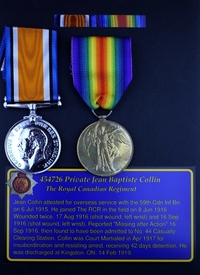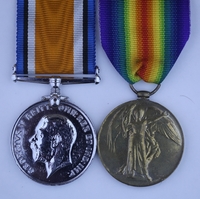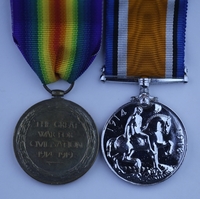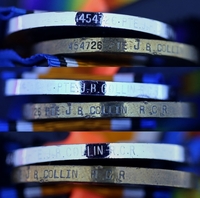
454726 Pte Jean Baptiste Collin
The Royal Canadian Regiment
By: Capt (ret'd) Michael M. O'Leary, CD, The RCR
Jean Baptiste Collin was born at Grand River, County Gaspe, Quebec, on 29 Sep 1896. The Collin family can be found in the Canadian Censuses for 1901 and 1911. Jean Baptiste was the fifth child (and fifth son) born to Phillipe and Elizabeth Collin, he also had two younger siblings, a sister and another brother. Between the two censuses, it appears that Collin's mother died, his father is shown to be remarried with a new wife (Marie Anne) in the 1911 census.
Collin attested in Ottawa for overseas service in the Canadian Expeditionary Force (C.E.F.) with the 59th Overseas Battalion on 6 Jul 1915. The 59th Battalion (Ontario), CEF was authorized on 20 Apr 1915 and recruited in Eastern Ontario and Hull, Quebec. It was mobilized at Barriefield, Ontario. The 59th Bn. provided reinforcements for the Canadian Corps until 6 July 1916 when its soldiers were absorbed into the 39th Reserve Battalion. Recruiting for the unit in Ottawa must have taken place in the armouries of The Governor General's Foot Guards, it was the Adjutant's Office stamp of this unit that was used to date Collin's attestation paper.
An 18 year old French Canadian lumberjack, Collin was single and was described in his service record as 5 feet 5 ½ inches in height, with a 35-inch chest, a dark complexion, blue eyes, and brown hair. Collin identified his father, Phillippe Collin, as his next of kin. On attestation he was assigned the C.E.F. service number 454726.
The 59th Battalion sailed from Halifax, Nova Scotia, aboard the S.S. Olympic on 1 Apr 1916. Collin and his fellow soldiers arrived in Liverpool, England and disembarked on 11 Apr 1916. He would remain with the unit until 6 Jun 1916, when he was struck off the strength of the 59th Battalion on being drafted to The RCR overseas.
Jean Collin landed in France on 7 Jun 1916 and taken on strength of The RCR in the field the following day. For the next few months, the Regiment's Battle Bar document shows the steady rotation between front line trenches, reserve positions, and working party tasks that were consistent elements of the infantry experience of the Great War.
The RCR rotated back into the forward trenches during the night of 12/13 Aug 1916. Over the next five days, the War Diary describes the dispersal of an enemy bombing raid by the use of grenades and machine gun fire on 16 Aug 1916 and a raid conducted by the Regiment on 18 Aug 1916.
On 17 Aug 1916, the War Diary noted: "Rain during the day making the waking very difficult. Enemy Artillery kept up a heavy shelling of our front line all day today but stopped at dusk. Night was quite quiet. 8 O.R. Killed, 23 O.R. Wounded."
Collin was wounded in action on 17 Aug 1916, suffering a gun shot wound ("G.S.W.") of his left wrist. G.S.W., in the medical terminology of the day could refer to either a bullet or shrapnel wound. Collin was quickly evacuated and on 17 Aug 1916 was admitted to No. 3 Casualty Clearing Station (C.C.S.) where he remained until discharged back to the Regiment on 2 Sep 1916. He would rejoin the Regiment and spend the following days in Reserve and Support areas. It would not be until 16 Sep 1916 that The RCR would engage the enemy once again, a fateful day for Collin.
On 16 Sep 1916, Jean Collin was reported "Missing after Action" and believed to be wounded. He was one of many casualties during the Regiment's courageous efforts as part of a Brigade attack that failed to penetrate or overthrow the objective of Zollern Graben.
The regimental history states in the aftermath, once the Regiment had withdrawn to Tara Hill: "after the weary companies and details had reported in, a check of losses in the engagement showed that [one officer] had been killed, that six [officers] had been wounded and that 264 other ranks were killed, wounded, or missing. Despite a draft of 110 other ranks, which reported from England on September 17, the Battalion, as it stood at Tara Hill that day, showed unmistakably the bitter effect of its first experience of battle on the Somme."
Collin's status as "Missing After Action" was updated on 18 Sep 1916 once it had been confirmed that he had been admitted to No. 44 Casualty Clearing Station suffering from a "G.S.W., left wrist." He was discharged the following day, on 19 Sep 1916. Over the following two weeks the Regiment would provide working parties to the front and move into Corps Reserve, returning to the front lines on 2 Oct 1916.
The next day, on 3 Oct 1916, Collin was buried by an explosion. Dug out, he remained in the trenches for the next few days.
On 7 Oct 1916, the day before the Regiment's attack at Regina Trench, Collin was admitted to No. 10 General Hospital, "Wounded, Shell shock." He was transferred to the Canadian Casualty Assembly Centre (C.C.A.C.) the same day and evacuated to England. On 8 Oct 1916, Collin was admitted to the 2nd Western General Hospital at Manchester. He would spend 94 days in hospital recovering from shell shock. His records note: "Injured through an explosion 3 Oct 1916. Buried by earth. Slight aphasia pains in head."
Collin was transferred to the Canadian Convalescent Hospital at Woodcote Park, Epsom, on 9 Jan 1917. A little over a week later, on 18 Jan 1917, he reported to the C.C.A.C. at Hastings and went on command to the 2nd Canadian Convalescent Depot, Hastings, "for D1," i.e., remedial training to get him back in shape for a return to front line service.
On 10 Mar 1917, Collin was transferred to the Nova Scotia Regiment Depot (N.S.R.D.) at Hastings. The N.S.R.D. was part of the new regionally based reinforcement system, with named Depots taking in troops from battalions raised in those areas in Canada and providing reinforcement drafts to similarly designated fighting units. The RCR, having been headquartered in Halifax in the decade before the War, was associated with the N.S.R.D. These Depots also became the parent unit for any soldiers returned to England from their affiliated battalions in France and Flanders.
Two days after joining the N.S.R.D., on 12 Mar 1917, Collin was posted to the 26th Reserve Battalion, Bramshott. While these changes of parent unit took place he was still on command to 2nd C.C.D., but would report to the 26th Res. Bn. on 16 Mar 1917.
Within a few weeks, Collin would be in trouble with the army. On 17 Apr 1917, he was Court Martialed. His crimes were "(1) Using insulting language to his Superior Officer" and "(2) Resisting escort" after being found not in possession of the appropriate pass when stopped by the Military Police. Details in his court martial record include the following:
"…in that he, at Haslemere on the 30th day of March, 1917 when ordered back to camp by Corporal Sandie, J.H.T., C.M.P., replied, "I won't go back to Camp, Fuck the Camp and Military Police."
"…in that he, at Haslemere on the 30th day of March, 1917 while under the escort of Corporal Sandie, J.H..T., Corporal Murray, J.H. and Corporal Eaton, F.G., did resist the said escort by kicking and struggling."
Collin was sentenced by District Court Martial to 42 days Detention. The court included a recommendation for mercy, on the basis that Collin "had been in custody for 18 days and on the ground of his youth, and on the ground that he has served in the field and been wounded twice." This sentence was confirmed on 18 Apr 1917 by Brig. General Meighan, who reduced the punishment by the remission of 21 days. Collin went to cells to serve the remainder of his sentence from 30 Mar 1917.
While with the 26th Res. Bn., Private Jean Collin completed the will in his Soldier's Pay Book on 21 May 1917. His will statement reads: "In the event of my death I give the whole of my property and effects to my father; Mr P. Collins, Grand River, Gaspe Co., Quebec, Canada." Less than a week later, on 27 May 1917, Collin landed in France once again at the Canadian Base Depot (C.B.D.) and was taken on the strength of The RCR.
It took a little longer for Collin to actually get back to the Regiment. He left the C.B.D. for the 3rd Entrenching Battalion on 14 Jun 1917, arriving at that unit two days later.
The Entrenching Battalion was employed as a ready labour force and by design its troops were a forward reserve of reinforcements for the division's fighting battalions. They were used as labour forces to maintain and build trenches or other work as needed. Collin spent ten days with the 3rd Ent. Bn. before rejoining The RCR in the field on 24 Jun 1917.
The month following Collin's return to the Regiment was filled by a period of training and then employment in Local Support to the front line followed by periods of Brigade and Divisional Reserve. Collin, however, did not remain with the unit, although his service record does not tell us exactly when he decided to leave the unit.
On 22 Jul 1917, Collin was taken on the strength of the 3rd Canadian Infantry Base Depot as a prisoner, having deserted from his unit. Four days later, he returned to the Regiment as a prisoner. Another gap in the details in his service record exists, as no details of being tried for desertion or punished have been found. Collin's only appearance in the database of Courts Martial on the Library and Archives Canada website is for April, 1917. Neither does he appear in the Part II Orders of the Regiment for any punishments.
Collin continued to serve with the Regiment through September, 1917. The cycle of front line, supports, and reserve filled the months until 1 Oct 1917, when he was admitted to No. 10 Canadian Field Ambulance with influenza. Discharged to duty on 6 Oct 1917, Collin was back in hospital on 24 Oct 1917, admitted to No. 8 Canadian Field Ambulance. Slightly wounded with a G.S.W. of the right leg, he returned to duty the same day.
Once again, on 26 Oct 1917, Collin was wounded in action. Admitted to No. 11 Stationary Hospital at Rouen with a G.S.W. right leg, annotations on one card in his service record note "accd" – accidental. This wound was serious enough to result in his evacuation to England. On 7 Nov 1917, Collin was posted to the N.S.R.D. as he crossed the Channel on the hospital ship H.S. Warilda.
Collin was admitted No. 15 Canadian General Hospital at Taplow on 9 Nov 1917. This hospital was also known as the Duchess of Connaught Canadian Red Cross Hospital, Taplow, Bucks. His wounds were classified as superficial, and considered healed enough for transfer on 4 Dec 1917 to the Canadian Convalescent Hospital, Hillingdon House, Uxbridge. A week later, on 12 Dec 1917, Collin moved again, to the Manor City of London War Hospital, Epsom.
Concurrent with his transfer to the Military Convalescent Hospital, Epsom, on 11 Jan, Collin was granted leave from 10 Jan 1918 until 26 Jan 1918. After six days in hospital, Collin would be discharged. His medical records would note "Wound healed. General condition good. No disability. Aiii."
On 16 Jan 1918, Jean Collin was taken on the strength of the 17th Reserve Battalion from the N.S.R.D. Undergoing remedial training in preparation for a return to the Regiment, Collin passed test for training in Anti Gas Training with the Small Box Respirator (S.B.R.) on 8 Feb 1918. Over the next two months he would also complete training and tests on Musketry, Bombing, Rifle Bombing, and Lewis Gun.
But Collin would not return to front line service, he remained with the 17th Res. Bn. throughout 1918. It was on 13 Dec 1918 that he was struck off the strength of the 17th Res. Bn. on transfer from the Overseas Military Forces of Canada (O.M.F.C.) to the Casualty Clearing Centre (C.C.C.) at Kinmel Park, Rhyl.
Collin was medically examined at Kinmel Park on 17 Dec 1918, preparatory to discharge. His condition was generally assessed as "normal," and the evidence of his wounds are noted as "G.S.W. left leg and right wrist, no disability."
On 18 Jan 1919, Collin was struck off the strength of the O.M.F.C. on transfer to C.E.F. Canada. He embarked at Liverpool aboard the H.M.T. Aquitania and disembarked at Halifax on 24 Jan 1919. At the end of January he was taken on the strength of the Casualty Company of No. 3 District Depot, Kingston, Ont. Placed on leave with subsistence allowance from 1 to 14 Feb 1919., Collin did have to be available for a medical examination on 10 Feb 1919 at Barriefield, Ont. The Medical Board classified him "Aii" and fit for duty.
Jean Baptiste Collin was discharged from the C.E.F. at Kingston, Ontario, on 14 Feb 1919. His proposed address after discharge was 12 Resine St., Quebec, Quebec. Collin's discharge certificate describes his marks and scars as "G.S.W. scar lower third right forearm, G.S.W. scar lower third left forearm."
For his service in the C.E.F., Collin received the British War Medal and the Victory Medal. His service records note that these were despatched to him on 14 Apr 1923. The same medal record card also shows that two replacement sets of medals were issued; one despatched on 13 Jun 1958, and the next on 13 Jan 1970. The second replacement set was only despatched after prepayment. (The two medals named to Collins in The O'Leary Collection, based on condition and naming styles, appear to be from two different pairs that were issued.) Collin was also entitled to a War Service Badge and received a replacement Class "A" badge, numbered 368840, on 14 Jun 1961.
On 17 Jul 1923, 23-year-old Collin married 17-year-old Yvonne Dianne Tremblay. The wedding ceremony took place at Missinabie, Ont.
Jean Baptiste Collin died on 2 Dec 1973.
Pro Patria
Visit a randomly selected page in The O'Leary Collection (or reload for another choice):
- The O'Leary Collection; Medals of The Royal Canadian Regiment.
- Researching Canadian Soldiers of the First World War
- Researching The Royal Canadian Regiment
- The RCR in the First World War
- Badges of The RCR
- The Senior Subaltern
- The Minute Book (blog)
- Rogue Papers
- Tactical Primers
- The Regimental Library
- Battle Honours
- Perpetuation of the CEF
- A Miscellany
- Quotes
- The Frontenac Times
- Site Map
QUICK LINKS
The O'Leary Collection—Medals of The Royal Canadian Regiment
Newest additions:
![]()
![]() SB-12725 Private Henry "Hank" Ard
SB-12725 Private Henry "Hank" Ard ![]()
WIA at Hill 187, Died of Wounds in Japan
![]()
![]() 2355331 Lance Corporal Albert Lorking
2355331 Lance Corporal Albert Lorking
Wounded in action, later a War Amps representative.
![]()
![]() 4334 / 477996 Pte Isaac Hamilton Wilcox
4334 / 477996 Pte Isaac Hamilton Wilcox
Permanent Force, South Africa, and C.E.F.
![]()
![]() 477019 Private Harold Ashcroft
477019 Private Harold Ashcroft
Transferred to the Tunnelers.
![]()
![]() 734231 Private Clark D. Thompson
734231 Private Clark D. Thompson ![]()
The older Thompson brother, killed in action.
![]()
![]() 733849 Private Norman Parker Thompson
733849 Private Norman Parker Thompson
The younger Thompson brother; post-war service in the Special Guard.
![]()
![]()
![]() A305 / 400305 Private Andrew Walker
A305 / 400305 Private Andrew Walker ![]()
"Previously reported Wounded, now Killed in Action."
![]()
![]() 823298 Pte Thomas Patrick Steele, M.M.
823298 Pte Thomas Patrick Steele, M.M. ![]()
… for gallant conduct in the field …
![]()
![]() P13066 Sergeant Harold Thompson
P13066 Sergeant Harold Thompson
Instrumental Soloist for over 20 years of Canadian Army service.
![]()
![]() 9609 / 477728 Private Albert Edward Piper
9609 / 477728 Private Albert Edward Piper
"Arrived from England as a STOWAWAY …"





